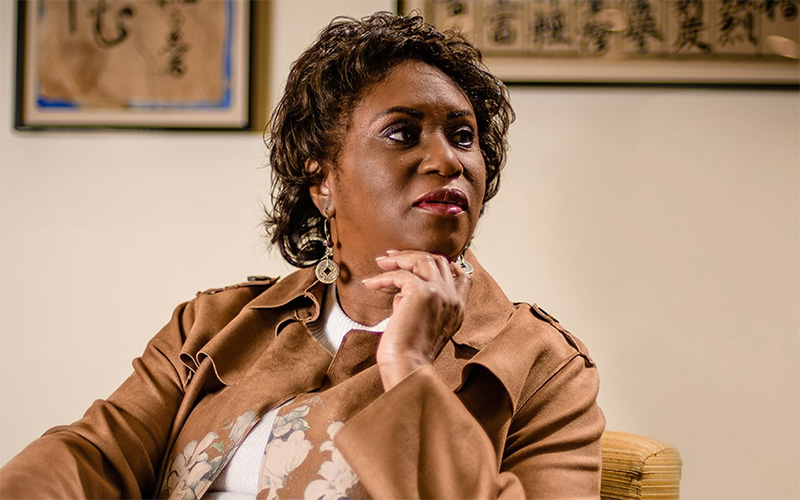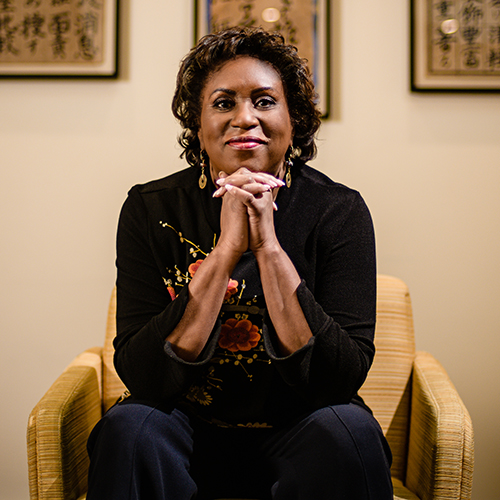
Without a Safety Net
UW Tacoma Professor Carolyn West has spent her storied career asking hard questions and exploring difficult subjects.
Superheroes handle the really big stuff. A purple-skinned rock enthusiast plans to wipe out half of all life in the universe with the snap of his massive fingers? Assemble the Avengers. A nihilistic evildoer in clown make up is wreaking havoc in your city? Warm up the bat signal.
But what about those emergencies that don’t include a spaceship, glowing orb or costumed villainy? Some days it feels like a thousand small fires have combined and now the entire world is ablaze. Yet, Superman isn’t coming. To my knowledge no one has an enchanted hammer or a shield made of indestructible metal to protect us against things like sexual harassment.
Superheroes don’t fight these battles.
Carolyn West does.
West doesn’t wear a cape and doesn’t possess laser vision or super speed. Indeed, she has no super powers as defined by the genre. This doesn’t mean she’s not extraordinary and that she isn’t a hero. Superheroes have the benefit of being able to fall back on their powers, to rely on their superhuman abilities to defeat the villain. West is that much more impressive because she chose to act armed only with a courage that wobbled at times but never faltered.
“I find the whole notion of being a superhero oppressive. Ironically when I decided to hang up the superwoman cape I became more productive.”
— Professor Carolyn West from “Escape the Cape”
The year is 1991 and a 35-year-old law professor settles into a leather backed swivel chair. Anita Hill is a professor at the University of Oklahoma College of Law. Hill earned her Juris Doctor degree from Yale in 1980. Less than a year later Hill took a position working with Clarence Thomas in the U.S. Department of Education’s (DOE) Office of Civil Rights. Hill worked with Thomas for two years, first at the DOE and then with the U.S. Equal Employment Opportunity Commission (EEOC).
The room is packed. Camera shutters open and close in rapid succession as flash bulbs dance across Hill’s face. Hill is seated by herself at a rectangular table covered in a dark green tablecloth. In front of her, a group of men (all white), members of the Senate Judiciary Committee, sit huddled together. Hill leans into the microphone and delivers her opening remarks regarding alleged sexual harassment by Thomas. Then-president George H.W. Bush nominated Thomas to fill the spot left open by Justice Thurgood Marshall’s death.
Hill is grilled during the hearing and asked a number of loaded questions including, “Are you a scorned woman?” and “Are you interested in writing a book?” The three-day hearings touched on many of this country’s open wounds including race and gender. Thomas was ultimately confirmed to the Supreme Court and is only the second Black Supreme Court Justice in the institution’s 232-year history. Thomas denied the allegations against him and suggested Hill’s comments were part of a larger, racist effort to keep him off the bench.
Women’s rights groups had been talking about sexual harassment for years but Hill’s testimony placed the issue front and center in the national consciousness. The number of sexual harassment claims filed with the EEOC went from a little less than 6,000 in 1991 to more than 15,000 by 1996.
Go West
In 1987 Carolyn West is a twenty-something first year graduate student in clinical psychology at the University of Missouri-St. Louis. West’s interest in the field started when she was an adolescent. That’s when she got her first library card. “My idea of fun was to check out five or six books and spend the summer reading and learning,” she said. The self-described nerd wasn’t reading Nancy Drew novels. “I was 12 when I checked out my first book on domestic violence (the seminal “Scream Quietly or the Neighbours Will Hear”). It was the first academic investigation of domestic violence and I wanted to understand the topic better.”
West did well in high school and received a scholarship to a first-generation student program at the University of Missouri-St. Louis. Here, West took a class on female sexuality from Dr. Suzanna Rose (now at Florida International University). “She became a mentor to me right away,” said West. “I’ve really modeled my career after her because she was just so accessible and available.”
West ended up taking over Rose’s human sexuality course during graduate school. “I became the instructor of record and soon discovered I had a passion for teaching,” she said.
The psychology department at the University of Missouri-St. Louis used to host something called the “Tahiti Party” as a way for faculty to get to know new graduate students. Attendees dressed up in beach attire and relaxed in a rented hot tub. West isn’t much of a partier but she decided the event would provide an opportunity to network and build relationships.
A faculty member approached West and struck up a conversation. His initial pleasantries quickly turned to asking questions about West’s personal life including whether or not she was seeing anyone. Later, he pressed West to leave the party with him. She refused.
The interaction rattled West. “I spent the next few years doing my best to avoid him,” she said. This strategy worked until West’s fourth year in the program (it’s a combined master’s-to-Ph.D. program). “I had to take my supervision class with him,” she said. “Students are given clients and they have to meet regularly with a supervisor to talk about the cases.”
The faculty member wanted to have the meetings at his house. West pushed for more neutral settings like an office or on-campus meeting space. “I met with him one night in his office and it was totally inappropriate,” she said. West remembers the faculty member commenting on her looks and making sexually suggestive remarks. “I was having back problems at the time and at one point he suggested I might be more comfortable if I lie on his desk,” said West. “I got the hell out of there.”

West filed a formal complaint with the university and eventually sued the school. The university investigated and found a pattern of harassment that went back years. The faculty member was given a choice: resign or be fired. He resigned. West eventually settled with the school. “It took about three years to resolve everything, and it destroyed my physical and emotional health for a long time,” said West.
West purchased a car with the funds she received from the settlement. She splurged and got vanity plates that read “GO WEST,” which is both an empowering reminder to herself and a portend of things to come.
The budding academic wrote her dissertation while doing two internships, one at the counseling center at the University of Notre Dame, the other at a hospital in rural Indiana that mostly served the Mennonite community. “I would get in my car on Friday night and I would drive six hours back to St. Louis where I’d work on my dissertation over the weekend and then come Sunday morning I’d get back in my car and drive the six hours back to Indiana,” said West.
West came to “campus” back in 1997. The entirety of UW Tacoma at that point fit inside the Perkins Building on South A Street in Downtown Tacoma alongside the Thea Foss Waterway. West had just completed the second of two postdoctoral fellowships. “I did my second postdoc at the University of New Hampshire at the top family violence research lab in the country,” she said.
West entertained different job offers but chose UW Tacoma for two reasons. “Mike Allen took me on a tour of the city when I was in town for the interview,” she said. “He told me, ‘This is a place where you can be a real person.’ I liked the idea that I could bring all of myself and I also knew that I wouldn’t be able to do the kind of research I wanted to do at a more traditional institution.”
UW Tacoma had one other psychologist on staff when West arrived and that person left in 1998. “For a while it was just me,” she said. West built the psychology program. “I hired people and got courses approved,” she said. “It was challenging but I enjoy building stuff.”
Over the years West has become one of the more beloved faculty at UW Tacoma. According to West, Associate Professor Christine Stevens once said to her “that I ‘teach without a net.’ That made me so incredibly proud. If you’re going to take a class with me I want you to know all that there is in the world and do it in a way that isn’t creepy or uncomfortable.”
This last part is important when one considers the classes West teaches. The topics covered in, say, her sexual deviance course, include pedophilia and erotophonophilia (lust murder). West doesn’t shy away from difficult subject matter when it comes to her research either. Her current research focus includes studying the long-term consequences of intimate partner violence and sexual assault. She also studies the hypersexualization of young Black women in the media as well as the exploitation of Black women in pornography.
Scrolling through West’s CV takes time. She is a prolific scholar whose credentials include dozens of scholarly articles, countless conference presentations, an award-winning book and a documentary. West has also been quoted in major publications included the New York Times and the Washington Post and was most recently featured in the documentary “Subjects of Desire” which premiered at South by Southwest.
West uses her expertise to help others. She is often asked to provide testimony in court cases that involve domestic violence, specifically instances where an abused woman fought back and either injured or killed her abuser. “These women are facing years in prison if convicted and I try to provide the bigger picture and show the impact of living in a situation where there is a persistent threat of violence,” said West.
Public Intellectual
Among her many honors, West was the first holder of UW’s Bartley Dobb Professorship for Study and Prevention of Violence, and she has been awarded the University of Washington Distinguished Teaching Award (2013) and the UW Tacoma Distinguished Research Award (2016).
Most recently West was appointed the inaugural Resident Fellow of the Office of Community Partnerships for an initial five-year term that runs from July 2021 to June 2026. “For me, this fellowship is about leaving a legacy,” said West.
West will be able to spend more time researching, writing, testifying in court and presenting at conferences. This is possible because the fellowship allows West to reduce her teaching load. “I love being in the classroom but I’ve been doing it for thirty years,” she said. “I want to be a public intellectual and make sure this work gets out there and begins to change the conversation about issues that are close to me.”
Dr. Ali Modarres, assistant chancellor for community partnerships, said that West exemplifies public scholarship. “Whether in court, public lectures, books or films, she offers her knowledge as a public good.”
“Dr. West's commitment to breaking the boundaries between academic and the public sphere is nothing short of remarkable,” said Modarres. “The OCP Resident Fellowship will allow her to capitalize on her decades of experience and dedicate more time to her work as a public intellectual.”
Place in History
West filed her lawsuit against the University of Missouri-St. Louis in 1990. Anita Hill’s testimony was still months away. The two are comparable in many ways. Both are incredibly smart women who took their passion for learning and ran with it. Both went to college and found success in their careers. Both went up against a system that was not built for them and often did not take their experiences into account. It’s worth noting that in 1991 data from the EEOC shows that nationwide, Black women accounted for only 2.2% of the more than 500,000 faculty positions at colleges and universities. This percentage hasn’t changed much in thirty years.
Anita Hill is remembered for her testimony. The Wikipedia page devoted to her life spends a disproportionate amount of time talking about the scandal and less about what happened before or after. It’s sad to think that a life full of moments can be so efficiently reduced in the public imagination.
West’s story ran in the St. Louis Post-Dispatch but she avoided the larger media firestorm that engulfed Hill. It’s striking to think that with both Hill and West, people with arguably the least amount of power, not just in their given situations but in the United States of the late 1980s/early 1990s, would be the ones to stand up and say something. It’s an indictment of sorts, but it’s also hopeful.
I mean, who needs superheroes when you have people like Dr. Carolyn West.



